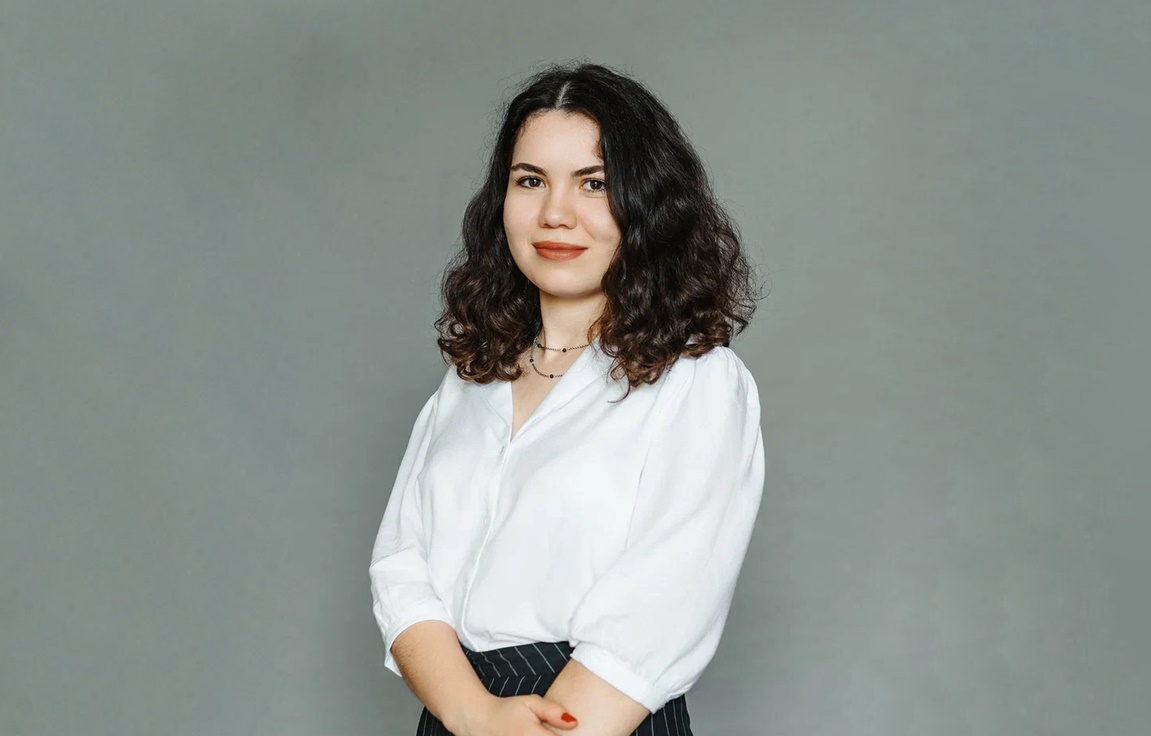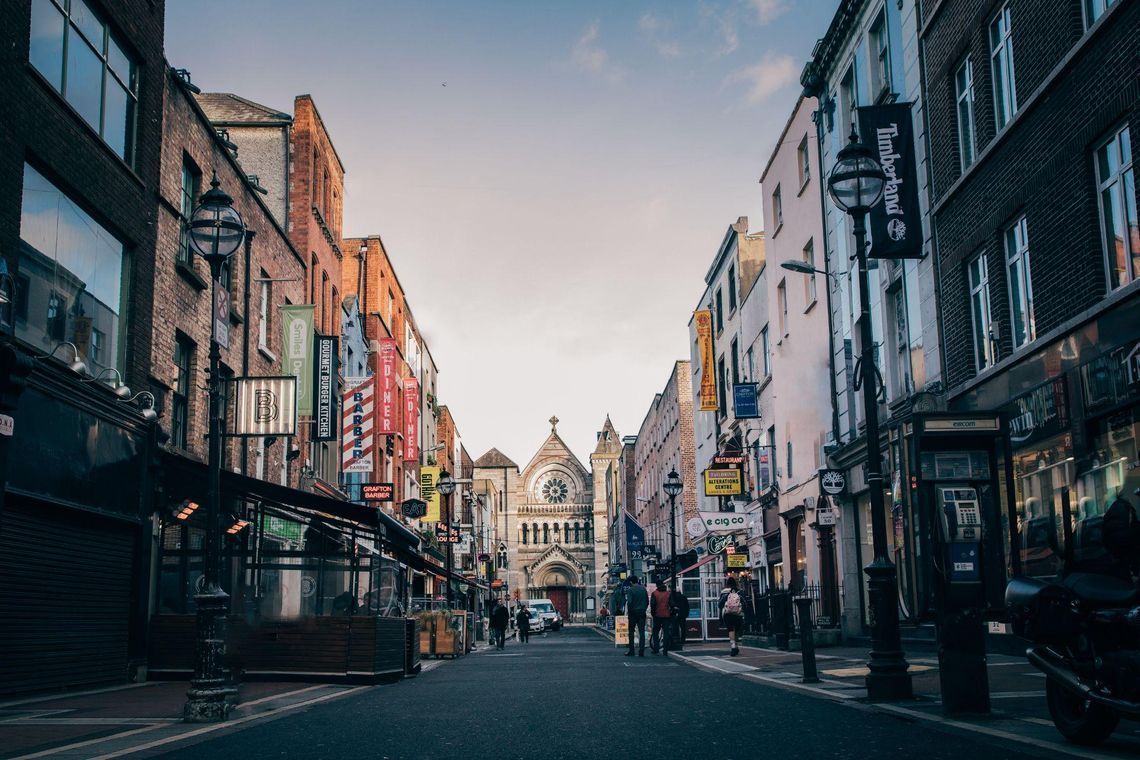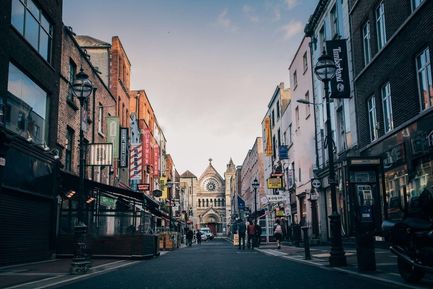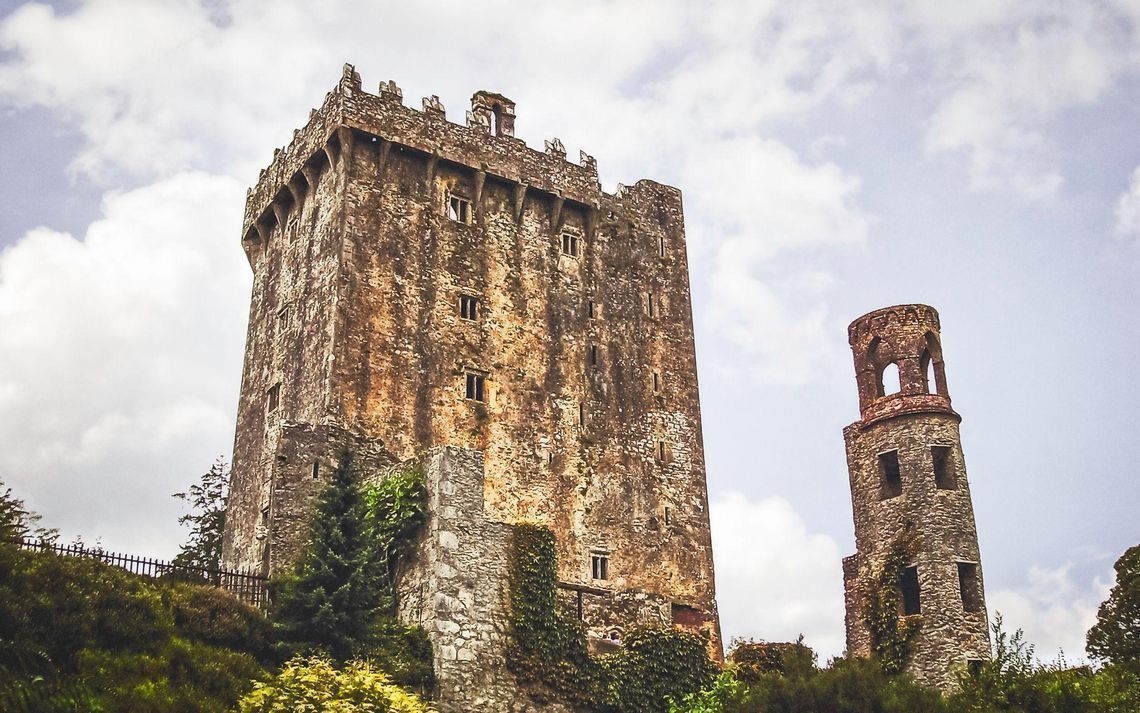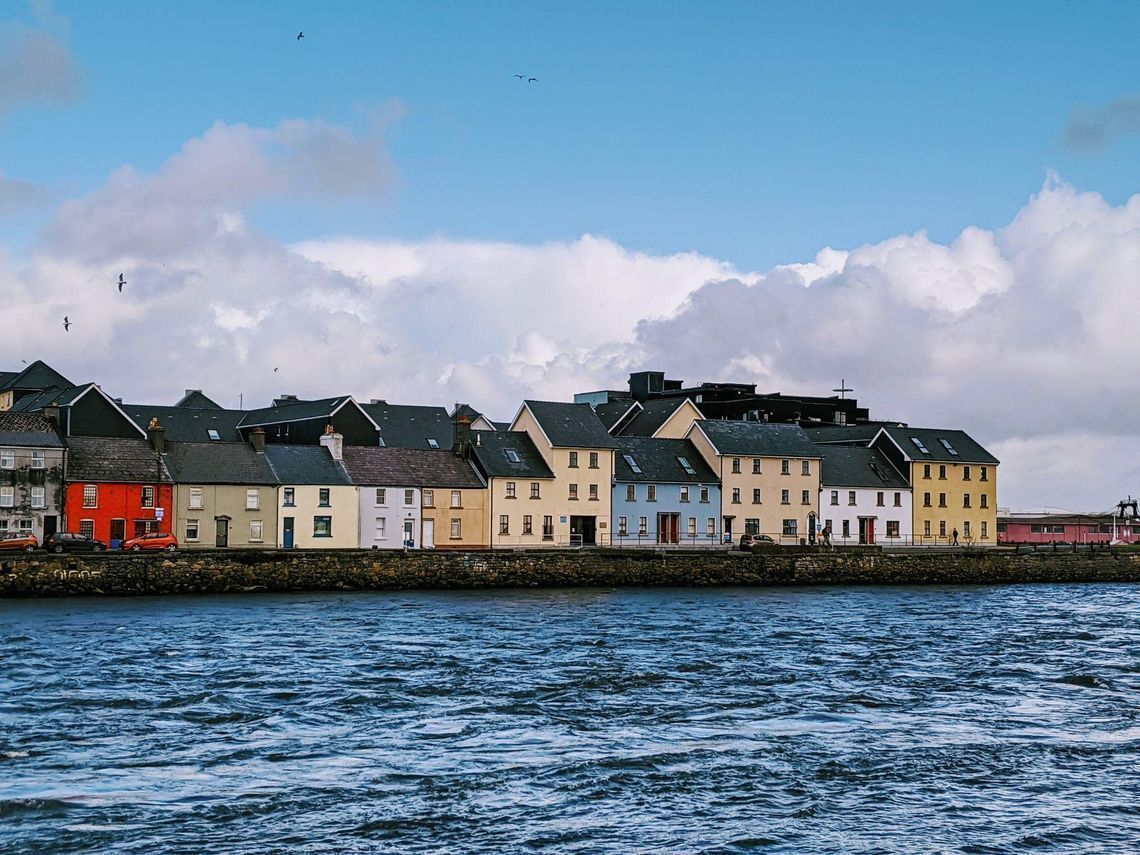
English language courses in Ireland are a budget-friendly option among other English-speaking countries. Learning the language here can be combined with evening pub crawls (there are about 7000 pubs throughout the country[1]), visits to ancient castles near major cities, and hikes to the mountains and hills of the Emerald Isle.
Advantages of English courses in Ireland
- Price. The average cost of a week of language courses in Ireland is 283 USD. This is lower than in other English-speaking countries. In the US, the standard weekly course costs 430 USD, in the UK — 424 USD, in Australia — 258 USD, and in Canada — 254 USD.
- Variety of courses. At Irish language schools, you can not only learn English, but also improve your business English skills, prepare for international exams, and absorb the language during special "field" lessons in the city.
- Pathways programs. At language schools and universities, you will find university preparation programs. They will help you learn the language to the required level and cover other disciplines needed for admission. Pathway providers in Ireland cooperate with both Irish and British universities.
- Jobs. Students with a category D visa, intended for long-term studies, can work 20 hours a week.
- Medieval atmosphere. If you are into medieval history, then Ireland is for you. The largest cities in the country were founded in the 9th-12th centuries. Ancient English and Norman castles are well preserved here.
Disadvantages of English courses in Ireland
- Irish accents. Residents of the country speak with a pronounced accent. Of course, common English is taught at language schools, but it can be difficult to understand the locals if you do not already have a high language proficiency. However, Irish accents are easier to understand than some UK dialects, such as Scottish or Geordie.
- Visa application. To get a student visa for short-term or long-term courses, you need to attach a motivation letter, language proficiency certificate, and proof of your intention to return home in addition to the usual documents (passport, invitation from the school, medical insurance, proof of financial solvency). All of this adds to bureaucratic worries and increases the time needed to prepare for the trip.
- Rent. Renting an apartment while studying is not a good idea. The average monthly rent in Ireland is 1,281 USD/month. You will pay the same approximate price (1,395 USD/month) in one of Europe’s most expensive countries — Switzerland.
Cost of language courses in Ireland
| School | Program | Weeks | Tuition Fee/week | Cities | Living in a residence/week | Homestay/week |
|---|---|---|---|---|---|---|
| EC | General English | 1-23 | 347 USD | Dublin | 374-395 USD | 203-299 USD |
| Intensive English | 1-23 | 406 USD | ||||
| Academic Semester / Year | 24-99 | 251 USD | ||||
| Intensive Academic Semester / Year | 24-99 | 294 USD | ||||
| English Plus | 1-50 | 91 USD/lesson | ||||
| IELTS | 1-23 | 347 USD | ||||
| English for Work | 1-12 | 406 USD | ||||
| Cambridge | 10 | 406 USD | ||||
| English in the City | 1-4 | 406 USD | ||||
| CES | Standard General English | 2+ | 310 USD | Dublin | 235-347 USD | 246 USD |
| Intensive General English | 2+ | 374 USD | ||||
| Combination Course | 2+ | 609 USD | ||||
| General English and Business | 2-11 | 374 USD | ||||
| IELTS Preparation | 2+ | 310 USD | ||||
| Intensive IELTS Course | 2+ | 374 USD | ||||
| Cambridge Examination Preparation | 9-13 | 352 USD | ||||
| Study and Work | 25 | 160 USD | ||||
| One-to-One Lessons | 2+ | 75 USD/lesson | ||||
| Multi-Destination Course | 25 | 214 USD | ||||
| Pre-Foundation Preparation Program | 12-32 | 320 USD | ||||
| General English with Work Experience | 4+ | 283 USD | ||||
| English Language and Activity Program | 2-4 | 833 USD | - | Included in the course cost | ||
| Super Intensive English Language and Activity Program | 2-4 | 950 USD | ||||
| English Language and Rugby Program | 2-4 | 1,036 USD | ||||
| FCE Fast Track Exam Preparation and Activity Program | 4 | 918 USD |
There are more than 70 language schools in Ireland and about 15 types of study programs in different cities. How do you choose the right program and deal with all of the documents for admission?
At UniPage, we cooperate only with accredited language centers, which, besides offering quality education and accommodation, provide discounts to our clients. Our experts will select a course in accordance with your goals, budget, and interests, send an application, and ultimately save your time.

Types of language courses in Ireland
| Type of program | Intensity | Group | Min. language level | Avg. cost per week |
|---|---|---|---|---|
| One-to-One | Individual | 1 | Starter (A0) | 75 USD/lesson |
| Afternoon General English | 15 | 8-10 | Starter (A0) | 208 USD |
| General English | 20 | 8-15 | Starter (A0) | 283 USD |
| Intensive English | 26-30 | 8-15 | Starter (A0) | 299 USD |
| Combination Course | 25 | 9-12 | Starter (A0) | 609 USD |
| Academic Semester / Year | 20-30 | 8-15 | Starter (A0) | 294 USD |
| English Plus | 2+ | 1 | Starter (A0) | 91 USD/lesson |
| Exam Preparation IELTS / Cambridge | 20-30 | 8-15 | Intermediate (B1) | 331 USD |
| English for Work | 30 | 8-15 | Intermediate (B1) | 406 USD |
| English in the City | 30 | 8-15 | Starter (A0) | 406 USD |
| Multi-Destination Course | 20-26 | 9-14 | Starter (A0) | 5,605 USD/course |
| Business English | 20-30 | 10-12 | Intermediate (B1) | 374 USD |
| General English with Work Experience | 20 | 10-14 | Intermediate (B1) | 283 USD |
| Junior programs (6-17 years old) | 15-20 | 10-15 | Starter (A0) | 1,068 USD |
| English Language and Activity Program | 15 | 10-15 | Starter (A0) | 1,671 USD/2 weeks |
| Super Intensive English Language and Activity Program | 20 | 10-15 | Starter (A0) | 1,895 USD/2 weeks |
| English Language and Rugby Program | 15 | 10-15 | Starter (A0) | 2,076 USD/2 weeks |
| FCE Fast Track Exam Preparation and Activity Program | 15 | 10-15 | Upper-Intermediate (B2) | 3,662 USD/2 weeks |
| Live and Study in Your Teacher's Home | 10-30 | 1 | Starter (A0) | 1,484 USD |
| Pathway | 20-30 | 10-15 | Intermediate (B1) | 214 USD |
| Pre-Foundation Preparation Program | 26 | 9-14 | Elementary (A2) | 320 USD |
| University Courses | 6-48 | 10-15 | Intermediate (B1) | 214 USD |
| Foundation | 30-40 | 10-15 | Intermediate (B1) | 17,615 USD/year |
| Pre-Master’s | 30-40 | 10-15 | Upper-Intermediate (B2) | 13,878 USD/year |
Language programs in Ireland can be divided into standard courses and those with additional options. In standard courses, you learn to read and write, study grammar and new words, practice listening and speaking. You can enter these programs even without knowing the language. They differ from each other only in intensity. These courses include:
- Afternoon General / General / Intensive English — courses that last 15 / 20 / 30 hours per week, respectively.
- One-to-One — individual lessons where you choose the course intensity.
- Combination Course — a program that consists of 20-25 group lessons and 5-10 one-to-one lessons with a teacher.
- English Plus. If you need a couple of additional individual lessons to complement the main course, this program is for you.
- Academic Semester / Year is a long-term course that lasts from 6 months to 2 years.
Courses with additional options allow you to not only practice your English skills, but also study other disciplines or practice the language for specific purposes: work, business, university studies, or passing exams. Often, at least an Elementary (A2) level is required for admission to such programs.
- Exam Preparation Courses prepare for IELTS or Cambridge exams. You also need to pay for the exam itself if you plan to take it at the end of the course.
- English for Work is suitable for office workers. In addition to improving English, students develop other skills that are necessary in the workplace: holding meetings, creating presentations for colleagues and clients, defending positions, and participating in business negotiations.
- Business English trains English skills in several areas: meetings and negotiations, sales, marketing, advertising, oral and written project presentations, business correspondence, and analysis of income and expenses.
- English in the City — these are additional lessons with walks around the city. You can purchase this option for General / Intensive English programs. During the week you study one topic, and on the weekends you practice new knowledge outside of the classroom with your teacher. For example, if the topic of the week was shopping, on the weekend you would go shopping and consolidate your acquired skills in practice.
- Multi-Destination Course. Some school chains that have centers in several countries allow their students to change locations during the course. For example, CES offers to study for 10 weeks in the UK and then finish the course at an Irish language center.
- General English with Work Experience is both an English course and an internship at a company. Students in this program spend 20 hours a week learning the language and the rest of the time working as an intern. However, internships are not usually paid, instead requiring you to pay about 641 USD for employment.
Teen programs
Children and teenagers aged 6 to 17 can also learn English in Ireland. Language centers offer the following summer programs: English Language and Activity and English Language and Rugby. As part of the course, students spend 15-20 hours studying English, and the rest of the time they play sports, participate in workshops, and visit excursions, museums, and galleries. FCE Fast Track Exam Preparation and Activity is the same program for teenagers aged 14-17 — only instead of the usual lessons, it includes 15 hours of preparation for the FCE.
Pathway
- Pathway — these are programs for those entering university, but do not yet meet the language requirements necessary to study. They help students improve their English to the required level. Pathway programs can be found at language schools and universities. The duration is from 6 months to a year.
- Pre-sessional Preparation Program. To enroll in Pathway programs, you must have an Intermediate language level. With Upper-Intermediate, the chances of admission are higher. If your English is not up to par, there is a Pre-sessional Preparation Program that will help you reach the desired level.
University courses
- English courses. In Ireland, some universities have language centers where everyone can study English — not just applicants and students of the university. Such universities include Dublin City University, University College Dublin, and University of Limerick. There, you will find the same courses offered at private schools: Business English, IELTS / Cambridge Preparation, and General English.
- Foundation / Pre-Master’s. These programs are designed for applicants who do not have enough academic and language skills to start their undergraduate or graduate studies. In addition to language lessons, they include classes in those disciplines that a student needs to enter the chosen course: mathematics, chemistry, physics, sociology, economics, and others. Foundation and Pre-Master's are offered at the following Irish universities: Trinity College Dublin, Technological University Dublin, and University College Dublin.
Read more about the types of language courses
Features of admission to Irish language schools
There are many options for studying English in Ireland: language schools, Pathway programs, and university courses.
It is easiest to enroll in language courses at schools or university centers. You only need to:
- Fill out the registration form on the official website
- Pay a deposit or registration fee
- Take an online language level test*
- Pay the full course cost no later than 2 weeks before the start of classes
- Receive an invitation from the school and apply for a visa
* The level test helps school staff find the right group. It can also be taken upon arrival at the school. However, it is still better to do this before departure. Otherwise, you may miss out on several activities on the first introductory day. Moreover, some programs, such as Business English or Exam Preparation, require a certain level of language proficiency.
When signing the contract, it is also important to read the terms and conditions concerning refunds if you decide not to take the course. Some schools, in addition to the deposit and registration fee, withhold part of the program cost. This amount depends on the number of days before or after the start of classes.
Pathway programs require more thorough preparation. When filling out the registration form, you will need to attach documents:
- IELTS (5.0-5.5) certificate or its equivalent (Cambridge, TOEFL)
- Documents on previous education with an attached transcript
Learning process in Irish language courses
Despite the fact that locals speak with a bright Irish accent[2], schools and universities teach generally accepted English (Received Pronunciation). Students devote most of their studies to the development of speaking skills. Even if you go through grammar in class, you do not do boring exercises all the time — instead, you work out new constructions in communication with classmates. This approach allows you to develop fluency and overcome the language barrier at a faster rate.

Accommodation options while studying in Ireland
| Accommodation options | Meals | Number of people per room | Min. cost per week | Avg. cost per week |
|---|---|---|---|---|
| Host family | Breakfast / breakfast and dinner | 1-2 | 203 USD | 262 USD |
| School residence | None | 1-2 | 235 USD | 374 USD |
| Apartment | None | 1-3 | 854 USD/month | 1,281 USD/month |
| Hotel | With and without meals | 1-2 | 427 USD | 747 USD |
Additional expenses
| Expense | Avg. cost |
|---|---|
| Consular fee | 64 USD |
| Registration fee | 53 USD |
| Accommodation | 53 USD |
| Medical insurance | 11 USD/week |
| Study materials | 5 USD/week |
| Delivery of an invitation by express mail | 80 USD |
| Airport transfers | 85 USD |
| Additional summer accommodation fee | 21-37 USD/week |
| Additional summer tuition fee | 27 USD/week |
Check the school website for additional costs.
Cost of UniPage services
| Service | Cost |
|---|---|
| Complete guidance in registering for courses — language schools abroad | 212 USD |
| Complete guidance in the admission process — university language courses | from 531 USD |
| Visa guidance | 478 USD |
Visa for language courses in Ireland
To take a language course in Ireland, you need to apply for a visa. The visa type depends on the duration of the program.
Short Stay Visa C (Visit-Tourist Visa) is suitable for courses up to 90 days. It may not be extended. To obtain it, you need to fill out an online application, pay the consular fee, and submit the following documents for consideration:
- Completed application form
- Motivation letter explaining the purpose and dates of your trip to Ireland
- Study plan, which includes the name and address of the educational organization, proof of payment for the course, and housing confirmation
- Invitation from a language school
- Medical insurance
- Consular fee payment receipt
- Passport
- 2 photos
- Proof of financial solvency (bank statement, sponsorship letter)
- Evidence that you will return home (certificate from work, property documents, university certificate)
Long-term visa D (Study Visa) is necessary for courses longer than 90 days. Documents necessary for registration, in addition to those mentioned above, include:
- English proficiency test (Duolingo, IELTS, TOEFL)
- Invitation from a language school, stating that the duration of the course is 15 or more hours per week
- Medical insurance (some schools may arrange student insurance)
If the student is under the age of 18, the documents must also be accompanied by a birth certificate and written consent of the parent or guardian for the child to stay abroad.
Upon arrival in the country on a category D visa, the student must register with the local migration office and apply for permission to remain in the country.
It is important to start the application 3 months before the start of the course, as the average processing time is 8 weeks. In addition, all documents must be translated into English and notarized[3].
Working while taking a language course in Ireland
It is not possible to work with a category C visa. Category D visa holders can work part-time — 20 hours a week. During the holidays, this period increases to 40 hours a week.

Most popular language schools in Ireland
EC
In Ireland, the EC English school is located in Dublin. It offers standard English courses, as well as English in the City, English for Work, IELTS / Cambridge Preparation, and Academic Semester / Year programs. There are also branches in the USA, Canada, Great Britain, Malta, and South Africa.
Students live in host families or hostels at the school. Course programs also include free English workshops, lectures, city tours, movie nights, trips to neighboring cities, and sports. The average cost of a weekly course, including accommodation and meals, is 566 USD.
CES
One of the centers of the CES international school is located near Dublin Castle. In addition to standard programs, you will find Study and Work, Foundation Preparation, and courses for teenagers. Students live in dormitories or host families. The average weekly cost, including accommodation, is 576 USD. In addition, CES offers a unique opportunity to learn English in several countries at once. The Multi-Destination Course allows you to spend half of the course in the UK and the rest of the time in Ireland.
Best cities to learn English in Ireland
Dublin
- Dublin is the capital and largest city in Ireland.
- In 2010, it received the “City of Literature” title. Many famous writers were born and lived here: Oscar Wilde, Bernard Shaw, Bram Stoker, James Joyce, Samuel Beckett, and William Butler Yeats.
- This is a real pub city, with a total of 751 pubs in Dublin.
- Dublin has the largest park in Europe — Phoenix Park covers an area of 707 hectares.
- The museum of Guinness, the popular beer brand, is located in Dublin. Here, you will be told about the history and traditions of the brewery, and the methods of making the drink. You will also be shown a collection of advertisements and beer barrels. At the end of the tour, you will go to the observation deck and be treated to a free pint of factory beer.
| Province | Leinster |
| Population | 506211 |
| Monthly expenses (excluding rent) | 974 USD |

Streets of Dublin Photo by: pexels
Phoenix Park Photo by: unsplash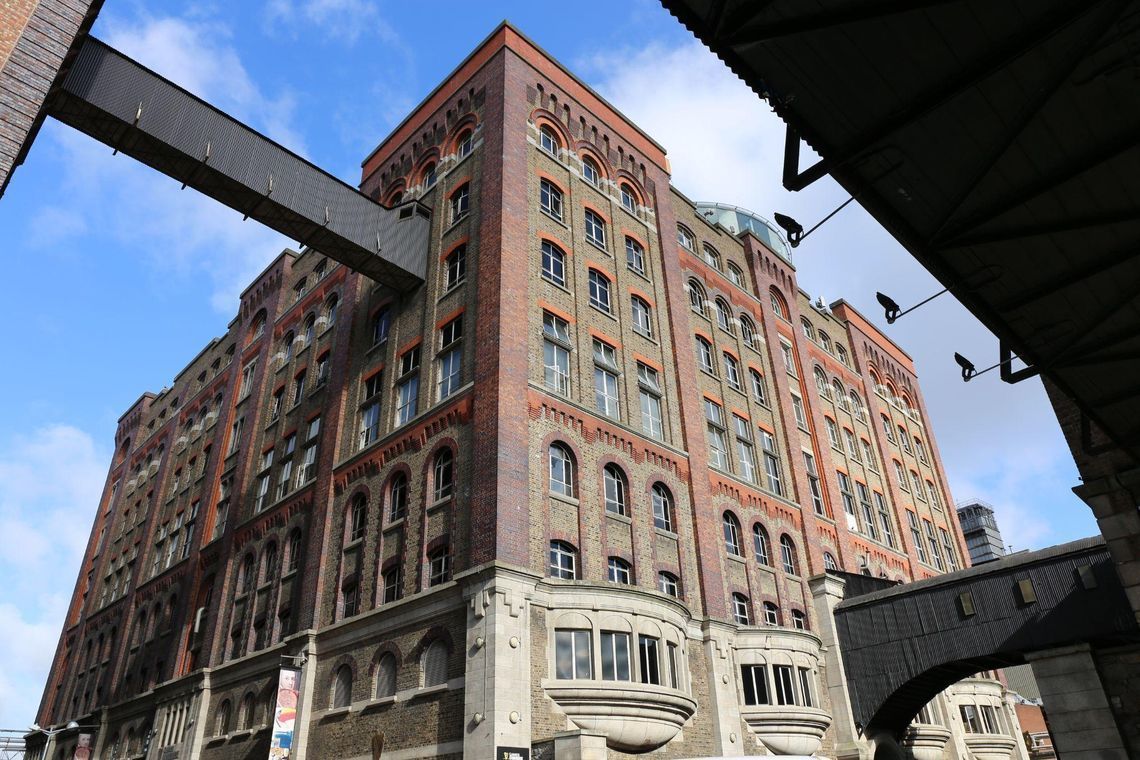
Guinness Storehouse Photo by: shutterstock
Limerick
- Limerick, the third largest and one of the oldest cities in Ireland, was founded by Vikings in 922.
- Irish whiskey coffee was invented in Foynes in 1943.
- One of the best preserved Norman castles in Europe is located here — the castle of King John the Landless.
- In addition to King John's castle, several medieval buildings can be found near the city: Bunratty Castle (1425), St. Mary Cathedral (1168), and The Black Castle (1600s).
- The Living Bridge, being the longest pedestrian bridge in Europe, was built on the territory of the University of Limerick. It crosses the Shannon River and is 350 meters long.
| Province | Munster |
| Population | 90757 |
| Monthly expenses (excluding rent) | 897 USD |
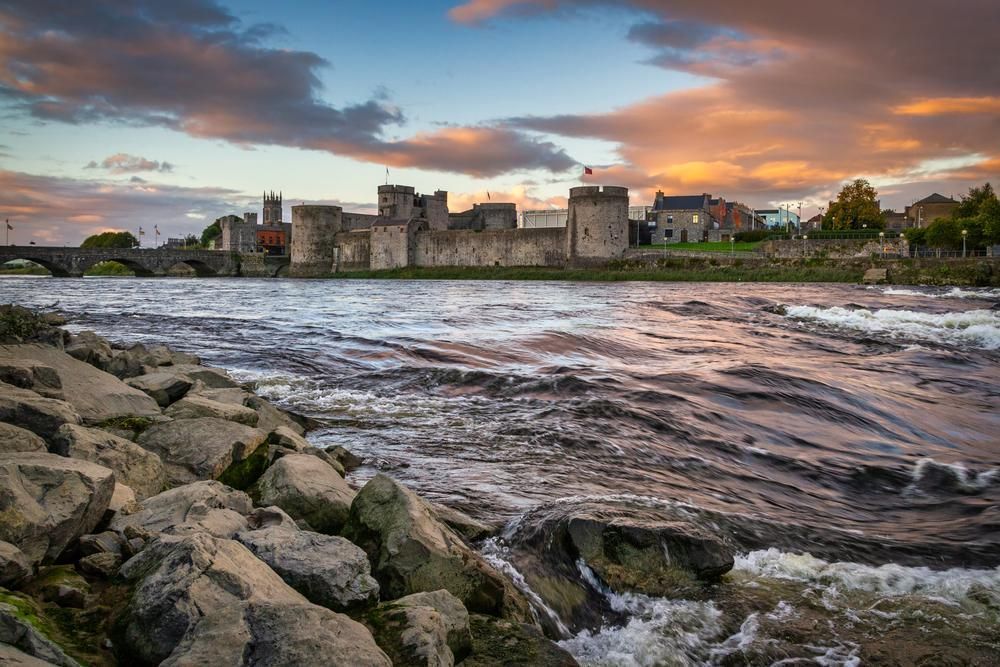
King John's Castle Photo by: shutterstock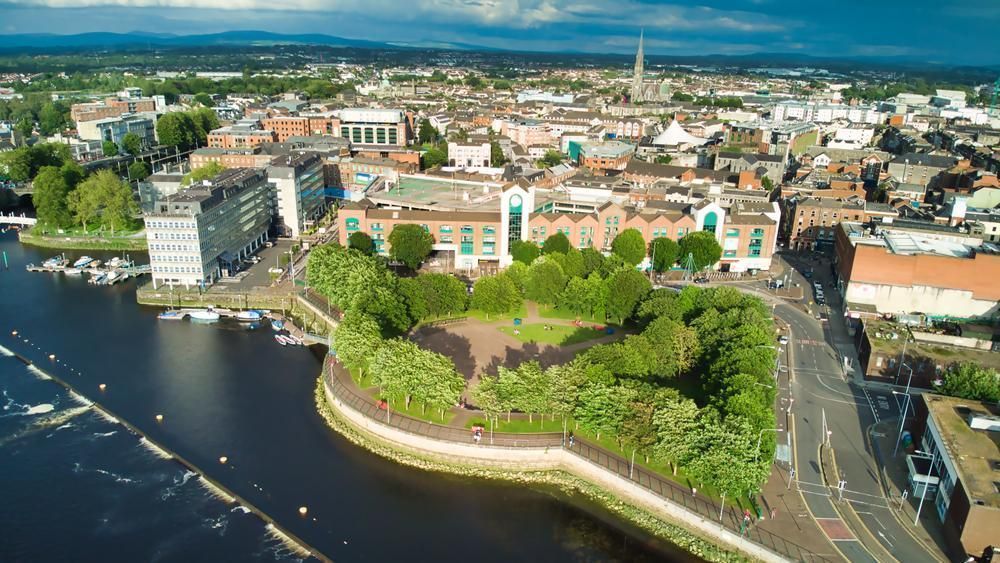
View of Limerick Photo by: shutterstock
Cork
- Cork is called The Rebel County. The history of rebellions in Cork can be traced back to the 9th century, when people destroyed a Viking castle and killed a Scandinavian leader. In the 12th century, the MacCarthy clan succeeded in turning Cork and neighboring County Kerry into the separate kingdom of Desmond. In the 15th century, the people of Cork participated in the rebellion against Henry VII. In the 20th century, the county played a significant role in the Irish War of Independence.
- Cork is home to Blarney Castle. According to legend, whoever kisses the Blarney Stone on the roof of the castle will receive the gift of gab.
- Cove is a port city in County Cork, the last port that the Titanic entered before it sank in 1912.
| Province | Munster |
| Population | 190388 |
| Monthly expenses (excluding rent) | 865 USD |
Galway
- In the Middle Ages (from the 13th to the 19th century), the city of Galway was ruled by 14 merchant families. Because of this, it received the name "City of the Tribes".
- The city is known for its vibrant lifestyle and numerous festivals, celebrations and events. Among them is the Galway Summer Arts Festival, which brings together about 500 musicians, artists, actors, writers, and poets.
- Many famous symbols are associated with Galway: the Claddagh Ring, a sign of love and friendship worn all over the world; Aran knitting — a style that originated in the Aran Islands near Galway; and traditional fishing boats — Galway Hookers with bright red sails.
| Province | Connacht |
| Population | 71983 |
| Monthly expenses (excluding rent) | 885 USD |
Want to learn a foreign language, improve your conversational skills, and prepare for exams?
UniPage specialists will select language programs according to your goals, interests, and budget, and help with enrollment.
